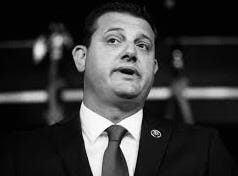The 3 Most Vulnerable California Republican House Members Voted to Cut Medicaid for Tax Cuts for the Rich
Democrats already have targeted the three seats for takeover in the 2026 midterm elections. They should start pounding the incumbents today about their shameful vote for Trump's tax cut



(Editor’s note: The 2026 midterm congressional elections represent the first electoral chance Democrats will have to check Donald Trump’s untrammeled power. Dems needs to flip just a handful of seats, and the campaigns to oust to three California Republicans – Ken Calvert, Young Kim and David Valdao – will be crucial. This week, all three voted for Trump’s tax cut, which cuts hundreds of millions in health care for poor people to pay for tax cuts for the wealthy. Here are some shameful details of how the deal went down. /JR).
By Joe Perticone The Bulwark
House Republicans passed their “big, beautiful bill” in the wee hours last Thursday, after a deceptive, opaque, decidedly rushed, and somewhat tumultuous intrapartisan negotiation process.
The bill passed 215–214–1, with all Democrats opposed and five Republicans either voting against, voting present, or missing the vote because they were sleeping. The bill’s fortunes improved through the night as one so-called moderate House Republican after another reneged on promises to preserve the social safety net.
Many of their constituents will be feeling the pain of the coming policy changes in the years ahead.
To get to their final product, the Rules Committee held a hearing open for twenty-plus hours while Republican leaders cut side deals with various factions.
The last-minute deals included a compromise with so-called “moderate” blue-state Republicans to increase the threshold for state and local tax deductions from $10,000 to $40,000, a paltry sum compared to what its primary advocates had originally sought.
Inking this deal was the only goal those moderates brought to the negotiating table, even though for months they loudly promised to prevent Medicaid from being fed to the ultraconservative wolves.
Orwell, call home. Republicans who pledged not to cut Medicaid, such as Rep. Mike Lawler (R-N.Y.), happily explained it away by redefining the word “cut.” In an interview, Lawler claimed the bill will actually “protect critical services like Medicaid.”
Other so-called moderates drew red lines around Medicaid early on, only to later erase those lines once it became clear that their colleagues were racing to cross them with axes in hand. In an April 14 letter, a group of Republicans wrote the following to leadership (emphasis mine):
We acknowledge that we must reform Medicaid so that it is a strong and long-lasting program for years to come. Efficiency and transparency must be prioritized for program beneficiaries, hospitals, and states. We support targeted reforms to improve program integrity, reduce improper payments, and modernize delivery systems to fix flaws in the program that divert resources away from children, seniors, individuals with disabilities, and pregnant women—those who the program was intended to help. However, we cannot and will not support a final reconciliation bill that includes any reduction in Medicaid coverage for vulnerable populations.
Cuts to Medicaid also threaten the viability of hospitals, nursing homes, and safety-net providers nationwide. Many hospitals—particularly in rural and underserved areas—rely heavily on Medicaid funding, with some receiving over half their revenue from the program alone.
Providers in these areas are especially at risk of closure, with many unable to recover. When hospitals close, it affects all constituents, regardless of healthcare coverage.
These are the Republicans who signed the letter:
David Valadao (R-Calif.)
Jeff Van Drew (R-N.J.)
Don Bacon (R-Neb.)
Rob Bresnahan (R-Pa.)
Juan Ciscomani (R-Ariz.)
Jen Kiggans (R-Va.)
Young Kim (R-Calif.)
Rob Wittman (R-Va.)
Jeff Hurd (R-Colo.)
Andrew Garbarino (R-N.Y.)
Nick LaLota (R-N.Y.)
Nicole Malliotakis (R-N.Y.
All of these Republicans voted to pass the bill this morning with the exception of Garbarino, who didn’t vote apparently because he was asleep.
These lawmakers have defended the bill as simply purging Medicaid of illegal immigrants and ensuring that those who can work are not relying on Medicaid in order to avoid doing so.
It’s a wildly inaccurate portrayal of what these reforms will actually do. The impact could be profound.
For example, more than half of Valadao’s constituents under the age of 65 are recipients of Medicaid or CHIP.1 His district has a higher percentage of Medicaid recipients than any other in the state, including 74 percent of children under the age of six.
Deficit chickenhawks. Those children in California’s 22nd Congressional District are among the night’s losers.
But, true to form, the Freedom Caucus were the night’s clear winners: Few groups of lawmakers are as well positioned or have a better understanding of how to extract concessions from leadership.
The far-right group got its way after several of its members caused a brief panic on the Hill and at the White House yesterday by complaining about deficit spending and the scope of government in the bill.
Following a meeting at the White House Wednesday afternoon, Republican lawmakers returned to the Capitol with new language for the text of the bill. Changes included striking various iterations of “MAGA” in the bill’s provisions and replacing them with “Trump.” (This is how “MAGA Accounts”—$1,000 savings accounts for newborns, established in the bill—became “Trump Accounts.”)
The major Freedom Caucus win came in securing an accelerated timeline for Medicaid work requirements, which most analysts project will result in millions of Americans losing care through the program; these requirements would now begin in December 2026 instead of 2029. Conveniently, that’s one month after the midterm elections take place.
Other changes include nixing tax credits for wind and solar power by 2028, speeding up the timeline by over three years.2
The one thing the Freedom Caucus didn’t do—and the thing they typically harp on about the loudest—was secure any deficit reduction.
Barring utterly improbable changes in the Senate, the bill will not reduce the deficit or even achieve deficit neutrality. Instead, it will explode the debt. Now, just as in the last Trump presidency, we see that purported deficit hawks are far more interested in securing large-scale tax cuts for the wealthy while raking the poorest Americans over the coals than they are in actually addressing our burgeoning national debt.
In the dead of night. Rushed and occasionally secretive processes, the sort that allowed for the witching-hour passage of the “big, beautiful bill,” have become a hallmark of the Trump era.
The dread prospect of failing to pass the bill had less to do with not implementing conservative policy and more with the risk of failing to get a legislative accomplishment in writing for Trump. That’s why, when things started to look rocky, the White House issued a statement of administration policy declaring, “President Trump is committed to keeping his promises, and failure to pass this bill would be the ultimate betrayal.”
“The media and the Democrats have consistently dismissed any possibility that House Republicans could get this done,” House Speaker Mike Johnson told reporters after the vote Thursday morning. “They did not believe that we could succeed in our mission to enact President Trump’s America First agenda. But this is a big one and once again they have been proven wrong.”
Sent to the Senate. Throughout the process, there was not much doubt about whether something would get over the finish line. The uncertainty had to do with the timetables.
Passage before Memorial Day was an arbitrary deadline Johnson set, and he’s met it, but it’s not as though the timing matters beyond his ability to claim a win—there was, for once, no government shutdown looming if the bill didn’t pass. The impending debt ceiling cliff is months away.
In addition to questions about timing, the other area of uncertainty had to do with how severe the cuts would be to Medicaid and other safety net programs for the poor. These anxious uncertainties have grown into grim certainties, and they are far more consequential than the bill’s timing.
Lawmakers have begun spinning the decision to slash millions of Americans’ health coverage through Medicaid cuts. Rep. Tim Burchett (R-Tenn.) said the priority is simply to get “illegals” off of Medicaid. “We’re not talking about kicking a single mom off of two kids, that kind of thing,” he said.
“Who’s gonna stand up and say, ‘I want somebody that’s illegally here in this country to be covered’? They’re not gonna be able to say that, and they know it, and shame on [Senate Minority Leader Chuck] Schumer and the rest of those clowns for saying that stuff,” Burchett added. “All they’re doing is trying to scare people, at least amongst us, and I think that’s pretty much a dirtbag move.”
The bill is now in the Senate’s hands. What eventually comes out of that chamber could create new problems in the House. But as we’ve seen, there isn’t much appetite for resisting the president’s demands. The job is simple: Get it done.
1) Valadao is one of the last remaining Republicans in office who voted to impeach Trump after January 6th, for what it’s worth.
2) This is yet another way climate change—often a political afterthought—could become electorally relevant. Scrapping green energy tax credits could detrimentally affect the hundreds of thousands of jobs in those industries, a majority of which are now in Republican-held districts. Stock prices for solar companies fell after the news of the bill changes affecting the industry came out.
Joe Perticone writes the “Press Pass” newsletter about Congress for the Bulwark. Subscribe to their menu of newsletters and podcasts here.
Images: L-R: Ken Calvert and David Valadao (Roll Call); Young Kim (L.A. Times).
